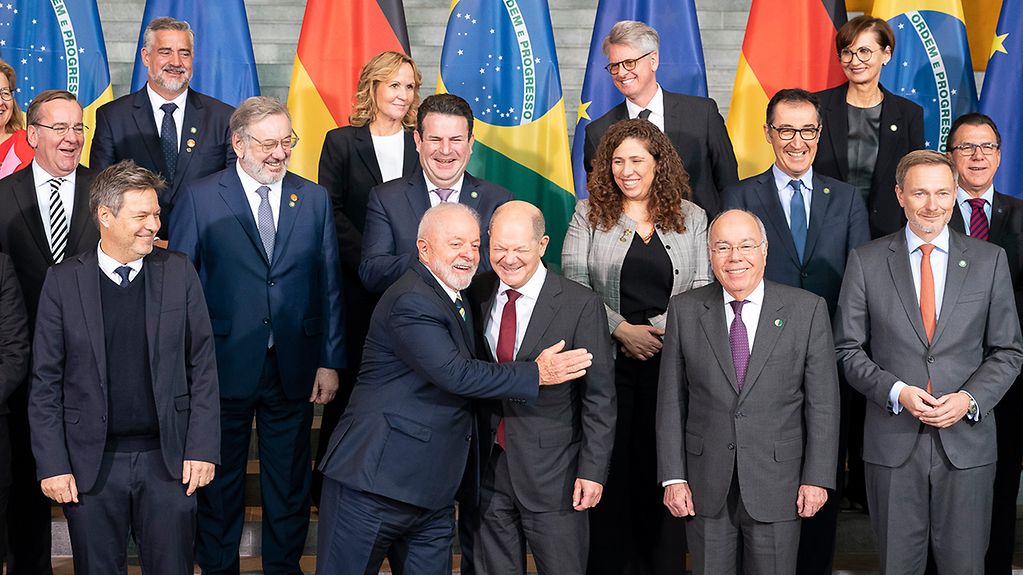German-Brazilian consultations
Germany and Brazil will cooperate more closely in future – for example in the fight against climate change and to achieve the decarbonisation of industry. At the 2nd German-Brazilian intergovernmental consultations, Federal Chancellor Scholz signed a “partnership agreement for a socially just and ecological transformation” with President Lula.

Intergovernmental consultations in Berlin: Germany supports Brazil in achieving its goal of “zero deforestation by 2030”.
Photo: Federal Government/Kugler
Despite a distance between the two countries of some 9,000 kilometres as the crow flies, Germany and Brazil have been linked by a strategic partnership for 15 years. The aim is to work together to achieve greater sustainability. “With a view to making even more of a difference in the future, we’ve just signed the ‘partnership agreement for a socially just and ecological transformation’,” said Federal Chancellor Olaf Scholz at the end of the 2nd German-Brazilian intergovernmental consultations in Berlin.
Joint projects for greater sustainability
Germany and Brazil are looking to work together on climate action, the decarbonisation of industry, forest conservation and biodiversity. “Germany supports Brazil in its goal of achieving ‘zero deforestation by 2030’ to protect the Amazon rainforest,” said Federal Chancellor Scholz. “We are united by climate protection – something that benefits us all.” Germany would help establish climate-neutral industries in Brazil and invest in climate research, said Scholz.
The Federal Chancellor particularly emphasised that this change could only succeed if it was socially just, which was why Germany was going to help create prosperity and jobs in Brazil. “Under our new transformation partnership, the responsible ministers have signed at least a dozen declarations of intent today so as to breathe life into the collaborative efforts between our two countries,” said the Federal Chancellor.
More in-depth cooperation is planned in the field of green hydrogen, for example. “Here we’re going to combine Brazil’s potential with Germany’s interest in green hydrogen to create a joint project that benefits everyone – in economic terms, too,” said the Federal Chancellor. Germany was also looking to strengthen the development of local supply chains in Brazil based on the eco-friendly extraction and processing of raw materials, said Scholz.
Brazil’s President Luiz Inácio Lula da Silva and his government travelled to Berlin for the 2nd German-Brazilian intergovernmental consultations. The event kicked off on Sunday evening with a dinner of a more informal nature attended by members of the two governments. After a joint plenary session on Monday, Federal Chancellor Scholz and President Lula also took part in an economic conference.
Focus on global conflicts
The government consultations covered a broad range of issues. At the joint plenary session, in the bilateral talks between the heads of government and at sessions involving the respective ministers, the topics covered included bilateral, economic and financial policy issues as well as the green transformation. Other subjects addressed included energy, climate, the environment, development and food.
In view of the wars in Ukraine and the Middle East, foreign and defence policy were also on the agenda. Scholz stated clearly that Russia was waging its war against Ukraine in violation of the principles of the United Nations Charter and international law. As one of the BRICS states, Brazil had an important mediating role to play in this war, said Scholz.
Despite differing views on the terror perpetrated by Hamas against Israel, both heads of government agreed that “we want a political solution to the Middle East conflict”. Even though it was currently difficult to imagine, Scholz and Lula said, they firmly believed that the two-state solution would enable Israelis and Palestinians to co-exist in peace.
Brazil, Russia, India, China and South Africa were the original BRICS countries. At the beginning of next year, the group will be expanded to include Argentina, Egypt, Ethiopia, Iran, Saudi Arabia and the United Arab Emirates, after which it will be renamed “BRICS plus”.
Support for conclusion of the EU-Mercosur agreement
Federal Chancellor Scholz and Brazilian President Lula then took part in a joint economic forum at the Haus der Deutschen Wirtschaft conference centre. The Federal Government is working with its Brazilian partners to develop an ambitious free trade policy and is seeking swift conclusion of the EU-Mercosur agreement.
“Brazil and Germany support the conclusion of the EU-Mercosur agreement so as to harness the enormous potential that lies in trade and economic relations,” said the Federal Chancellor. “We are firmly committed to ensuring that the agreement is now finalised swiftly. Negotiations on the European side are being conducted by the European Commission, and President Lula and I remain in dialogue on this.”
Agreements such as Mercosur benefit both sides economically by creating and securing jobs and investments. They also promote adherence to social and ecological standards. The Federal Government seeks to ensure that free trade is fair, social and ecological, thereby guaranteeing prosperity and sustainable economic growth.
Mercosur is one of the world’s largest free trade zones with a total population of more than 700 million. It includes provisions on political dialogue, cooperation and trade. The EU has been in talks with the four Mercosur states of Brazil, Argentina, Uruguay and Paraguay for well over 20 years, but an agreement in principle arrived at in 2019 has not been implemented due to ongoing concerns regarding such issues as rainforest protection.